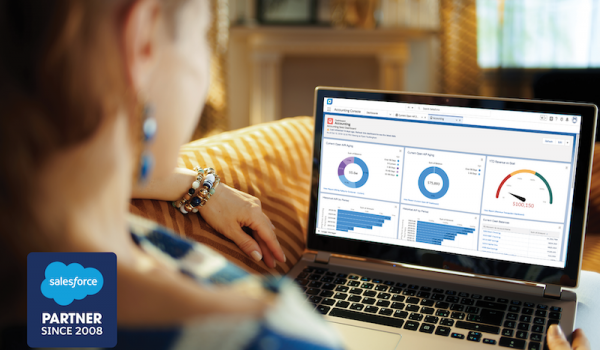
Most businesses recognize Salesforce as a powerhouse Customer Relationship Management (CRM) system that maximizes the sales process. But that’s just scratching the surface of its full potential. This blog comprehensively examines how integrating your accounting processes within Salesforce can improve your business’s financial management, ensuring efficiency, accuracy, and real-time financial insights.
Discover the seamless integration of accounting into your Salesforce ecosystem with Accounting Seed’s Salesforce Accounting Software.
Newsletter sign up
"*" indicates required fields
Does Salesforce Do Accounting?
Short answer: Not really.
Salesforce can do accounting functions, but not alone. On its own, Salesforce is a Customer Relationship Management (CRM) software, which focuses on managing and tracking the sales process. While it does have add-on features like Salesforce Billing and Revenue Cloud, it’s not a dedicated accounting system.
Even with these add-on features, you still need to track transactions, and account for the debits and credits in your business. Additionally, you then have to compile and analyze this data to understand your financial health. You can’t do this with the Salesforce product alone, but that’s where other software comes into play. While Salesforce can work with outside technology or, it works best with native software. It is through native Salesforce accounting software that you can run accounting fully in your Salesforce instance.
To see how to integrate real-world, efficient accounting into Salesforce schedule a demo with one of our experts.
What Does Financial Management on Salesforce Look Like?
You may be familiar with the urgency and stress associated with accounting. Maybe it’s why you’re looking for a better accounting application. If you’re on Salesforce, you can connect and streamline all your major applications to consolidate operations onto a single platform.
Combining your CRM and accounting software allows you to increase your access to on-demand financial analytics as well. Giving you the ability to quickly analyze huge volumes of data and drill into niche areas of your business with ease.
When you add accounting into the mix, the financial process behind your operations gets easier and more accurate. Let’s look at how.
Efficient Flow Between Salesforce and Accounting Data
Most, if not all, of your business tools need to share data with your accounting system. Whether it’s processing a vendor payment, turning a quote into a bill, or recognizing a customer transaction started in another software, these tools must communicate the transaction to the accounting system. The accounting software takes over to account for and track the finances that were generated. On Salesforce, this data-sharing can be instantaneous thanks to the connectivity between platform applications. Some of the most common connections start with Salesforce’s Sales Cloud and Service Cloud.
Automated, Hands-Free Accounting Lifecycles
Salesforce on-platform accounting eliminates the need to monitor expenses or track billing in a separate system or spreadsheet. On Salesforce, you can click a button in one app and the accounting will take over when it’s needed. It’s as easy as initiating a bill in Salesforce and then having that data show up in your general ledger for processing and recognition.
Accounting Seed’s Automations can be more refined and effective because all of your data is in one place. This allows your accounting lifecycle to be more efficient and visible because the relevant data is connected to your accounting system, uninterrupted.
More Accurate Accounting with Less Hassle and Expenses
The lack of interruptions or having to manually input data also eliminates accounting errors and gives you fast answers and accounting processes like monthly close. This also saves you more money!
Go Native, Get Better Accounting
Using native applications all on a single platform simply gives you better accounting. Instead of juggling the different components and finances of your business, you can focus on commanding your whole business through a single, trusted platform.
What is Accounting Seed?
Accounting Seed is accounting software built natively on Salesforce. With Accounting Seed, you get real-time visibility into your organization’s financial performance with accounting automation and customization features. And because we connect seamlessly with your Salesforce data, records are instantly connected from sales opportunity to invoice.
Leverage Salesforce accounting software
Streamline accounting processes on Salesforce with Accounting Seed.
See Accounting Seed in action
Get a close-up view of how accounting on Salesforce can eliminate the need for costly integrations—and silos of mismatched information—by sharing the same database as your CRM.



